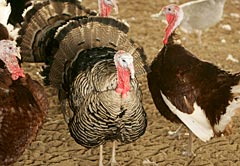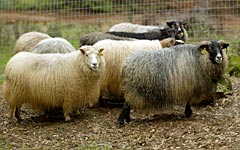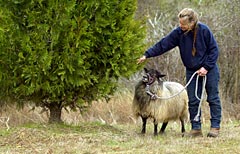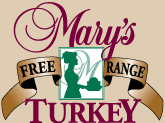Organic, grass-fed, free range: Specialty meats are on the rise.
By Joan Obra / The Fresno Bee
 |
|
Fresno-based Mary's Turkeys raises free-range, free-range and
organic, and free-range heritage turkeys.
|
(Updated Friday, January 20, 2006, 12:58 PM)
Have you had some organic turkey lately? Or grass-fed beef and perhaps
some Icelandic lamb?
As Americans become increasingly sophisticated about food, demand for
specialty meat is rising. Consumers concerned about livestock-rearing
methods are looking for organic or free-range meats. Others want animals
that were raised locally and sustainably -- a method that helps preserve
the land. Others seek out unusual flavors in heritage turkeys or
free-range beef.
For example, the market for organic meat is growing quickly. National
sales of organic beef, lamb, poultry, pork and fish were $75 million in
2003, a 77.8% jump from 2002 sales of $42 million, the Organic Trade
Association says. Between 2004 and 2008, organic meat sales are expected
to grow 30.7% yearly, the association adds.
But as awareness of boutique meats rises, shoppers may wonder about
producers' claims. What do terms such as "natural," "no added hormones"
and "free-range" really mean?
Mary Pitman of Fresno-based Mary's Turkeys has fielded lots of these
questions since 1998, when she and her husband, Rick, launched a
free-range turkey operation. The company now sells free-range turkeys,
free-range organic turkeys and free-range heritage turkeys, which are rare
breeds prized for their richer flavor.
Demand has forced the company to grow. The Pitmans raised 5,000 turkeys
under the Mary's brand in 1998, and now they raise 100,000 a year. In a
few months, Mary's also will introduce free-range ducks, free-range
chickens and free-range organic chickens.
"In 1998, we were just explaining to the consumer what free-range was,"
she says. "From the second year, they were asking, 'Is it organic?'
... A
big question this year was 'Does it have gluten?'"
Because of all the questions, the Pitmans expanded their food labels.
For example, the free-range, organic turkey package contains "raised
without antibiotics, raised without added hormones or steroids, no
preservatives, fed no animal by-product."
The wrapping also notes that under federal rules, no poultry can be
treated with hormones.
"Whatever you have on the label can save a lot of questions for the
meat department, the stores and for us," Mary Pitman says.
To the Pitmans, free-range means raising their turkeys with open space
to roam, both outside and under covered shelter.

The sheep at
Bella Vista Farms usually graze on grass about four months of the year.
They are also fed Icelandic kelp, alfalfa hay and other supplements.
Darrell Wong /
The Fresno Bee
"They are allowed to go in and out as they please," Mary Pitman says,
who adds that the turkeys don't forage; instead, they eat a special feed
without added antibiotics.
However, the term "free-range" doesn't always fit the Pitmans' view.
According to federal government rules, "free-range" means that animals
have access to the outdoors. But the standards don't set a minimum amount
of time spent outdoors. And the term does not indicate what the birds were
fed.
Also confusing is "natural," which the federal government defines as
minimally processed and without artificial ingredients. The term, which
applies to meat and poultry products, is so broad that it doesn't inform
consumers well.
The Pitmans don't use "natural" on their labels.
"I don't like that word," she says. "I'm very distrustful."
Though "natural" is a loose term, Western Grasslands still puts it on
its labels. Based in Vina, near Chico, the natural, organic and grass-fed
beef-marketing company sells meat to Wal-Mart labeled "All Natural
Grassfed Angus Ground Beef."
"Any [raw cuts of] beef, chicken or pork would qualify as natural,"
since they are all minimally processed, says Mack Graves, Western
Grasslands' chief executive officer.
What sets Western Grasslands apart from conventional beef, Graves says,
is the way its cattle are raised. For the first year of their lives, the
cattle graze on pastures, including one in the foothills east of Exeter.
After the cattle turn a little more than a year old, they are moved to
large enclosures -- 500 square feet per animal -- and fed until slaughter
with a diet of grass hay and a small amount of rice bran and almond hulls
for 60 to 90 days, Graves says. The cattle, he adds, never are given
hormones or antibiotics.
By contrast, conventional cattle are fed a grain diet that can contain
antibiotics, Graves says.
Slaughter and processing of Western Grasslands' beef occurs in plants
such as Beef Packers on South Fig Avenue near Roy Avenue in Fresno or
Specialty Branded Products on North Brawley Avenue near Nielsen Avenue in
Fresno.
Various restaurants cook Western Grasslands' beef, including Acme Chop
House in San Francisco and Yosemite Lodge in Yosemite, Graves says.
Health-conscious shoppers are largely responsible for Western
Grasslands' growth. About a year ago, Western Grasslands was slaughtering
cattle at a rate of 20 to 30 head per week.
Now, the company is processing 120 to 150 heads of cattle every week.
The publicity surrounding mad cow disease "raised the level of
visibility of all beef companies," Graves says. Beef consumption in
general, he adds, has risen steadily over the past five years, fueled by
the now-waning craze for low-carb diets.
The appeal of grass-fed beef is explained by Jo Robinson, the author of
"Pasture Perfect: The Far-Reaching Benefits of Choosing Meat, Eggs and
Dairy Products from Grass-Fed Animals."
"It is lower in fat and calories and higher in omega-3 fatty acids,"
she writes. "These differences alone justify a switch to pasture-raised
beef."
Consumers still have to do their research to ensure a quality product,
however.
Like "free-range," the term "grass-fed" on a food label doesn't
guarantee that the cattle eat only -- or mostly -- grass. The U.S.
government doesn't require inspections to verify companies' claims.
To check quality, it's sometimes best for shoppers to call ranchers and
ask about livestock-raising methods. At tiny Bella Vista Farms in North
Fork, calling and e-mailing are the only ways to find out more about
Icelandic lamb raised by Jim and Peggy Nelson. Bella Vista sells meat
directly to individuals and to the Three Sisters Bistro in Oakhurst.
Their purebred sheep are a hardy race that traditionally graze on
pasture in Iceland. The lamb meat is mild-flavored and fine-grained.
Bella Vista's lamb "has got a good flavor," says Richard Beyerl, who is
taking over the restaurant from retiring owners Reinhild and Glenn Gamboa.
"It doesn't have that gamy aftertaste. ... It's not stringy or chewy."
At the moment, Bella Vista has about 25 Icelandic sheep. The Nelsons
are breeders, and they talk of improving their animals' meat
characteristics. Long loins, broad backs and straight legs with
well-developed muscles are desirable, they say.
A visit to Bella Vista shows Icelandic ewes, lambs and rams playing or
resting in large pens. When grass is in season (about four months of the
year), the sheep voraciously graze on it. The Nelsons say they supplement
the animals' diet with Icelandic kelp, grass and alfalfa hay, a salt
mineral mix and a tiny amount of oats, barley, corn and molasses. Each
animal receives about 11/2 tablespoons of the premium grain per day. The
sheep need the grain because of a mineral deficiency in the water.
"There's no hormones, no antibiotics," Nelson says. "We also do not use
any pesticides or herbicides on the property." The product isn't certified
organic, however, since the grass and alfalfa hay fed to the animals isn't
organic.
The Nelsons' next step: developing additional pastures on their 10
acres.
"We don't want to be that big," Peggy Nelson says. "We want to do the
right thing by the land."
Of course, shoppers of specialty meats don't always have time to visit
the ranches where the livestock is raised. Those who want meat with a
federal guarantee of quality should buy organic.
Look for the words "100% Organic," "Organic" (95% organic ingredients)
or "Made with Organic Ingredients" (at least 70% organic ingredients) on
the front of the package. The U.S. Department of Agriculture-accredited
certifier's seal must also appear on the information panel.
The national rules call for organic ingredients that haven't been
genetically modified or treated with irradiation or sewage-sludge
fertilizer. Most pesticides, hormones and antibiotics cannot be used.
Also, organic meat cannot be fed mammalian or poultry products.
With sales of organic meat growing at such a fast pace, Western
Grasslands -- like Mary's Turkeys -- is expanding in the market. In
February, the company will begin processing organic, grass-fed beef.
Graves' prediction: "Organic will eventually replace natural beef in
the natural products stores like Whole Foods."
The reporter can be reached at
jobra@fresnobee.com or (559) 441-6365.
Kurt Hegre /
The Fresno Bee

Jim and Peggy
Nelson's Icelandic sheep aren't given hormones or antibiotics. Also, the
Nelsons don't use pesticides or herbicides on their North Fork property.
Darrell Wong /
The Fresno Bee |







